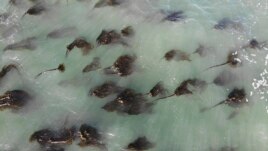31 October, 2019
Scientists say fast-spreading sea urchins have eaten away at huge underwater kelp forests in California and Oregon.
The invasion by tens of millions of the sea creatures is causing the destruction of important forms of sea life.
A recent count found 350 million purple sea urchins on one Oregon reef alone. That is more than a 10,000 percent increase since 2014. In Northern California, 90 percent of large kelp forests have been swallowed up by the urchins.
Scientists have reported finding so-called "urchin barrens," or huge stretches of the seafloor that contain nothing but sea urchins. Such growth has spread from California to waters off the state of Oregon, where kelp forests were once so thick that boats had trouble passing through.

This Sept. 26, 2019 photo shows an aerial view of one of the last remaining kelp forests near Elk, Calif., on the Mendocino County coast, which has lost more than 90 percent of its bull kelp in less than a decade. (AP Photo/Terry Chea)
Scott Groth is a shellfish scientist with Oregon's Department of Fish and Wildlife. "We're in uncharted territory," he told The Associated Press. "You can't just go out and smash them. There's too many. I don't know what we can do."
The explosion of purple sea urchins is one of the many problems now facing the Pacific Northwest's ocean environment.
Kelp has already been struggling because of warmer-than-usual waters in the Pacific Ocean. In 2013, a mysterious disease began destroying tens of millions of starfish. One starfish species, called the sunflower sea star, is the only known creature that seeks to feed on the purple sea urchin.
Also around 2013, the purple urchins had two very good mating years. With no animals feeding on the urchins, their numbers continued to grow.
Steve Rumrill is a shellfish expert at Oregon's wildlife agency. He told the AP the huge growth is being driven by starvation. "You can imagine all of these small urchins growing up, each one of them looking for food, desperate for food," he said. Rumrill added that while he has seen major population changes in sea urchins before, nothing comes close to the latest explosion.
Scientists say they are not yet sure if climate change is to blame. But they suspect it did play a part in the events that helped the purple urchins spread so quickly and widely.
Norah Eddy is a director at the Nature Conservancy California's oceans program. She gave another reason for the explosion. She said the area's kelp, which has already been weakened by warming waters, is not able to regrow itself as well as in the past.
"We're going to see climate change as a big driver of changes in kelp forests as we move forward, and we are already seeing that," Eddy told the AP. She is leading an effort to use drones to map and observe Northern California's remaining kelp forests.
The destruction is also having economic effects. Until now, red abalone and red sea urchins, a larger and meatier species of urchin, supported strong fishing businesses in California and Oregon.
A study released this week by the University of California, Davis found that 96 percent of red abalone had disappeared from California's northern coast.
Last year, California closed its red abalone fishery, which had brought an estimated $44 million into the coastal economy every year. In Oregon, officials suspended permits for its 300 abalone divers for three years.
I'm Bryan Lynn.
The Associated Press reported on this story. Bryan Lynn adapted the report for VOA Learning English. Ashley Thompson was the editor.
We want to hear from you. Write to us in the Comments section, and visit 51VOA.COM.
_________________________________________________________________
Words in This Story
kelp – n. a large, brown plant that grows in the sea
reef – n. a line of rocks or sand at or near the surface of the sea
barren – adj. unable to produce plants
uncharted – adj. never before described
species – n. a group of plants or animals that share similar qualities
desperate – adj. needing or wanting something very much
drone – n. an unmanned aircraft guided by remote control